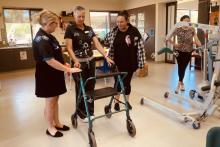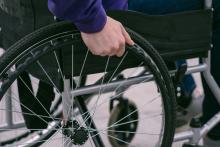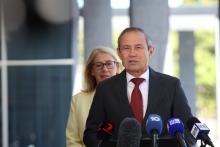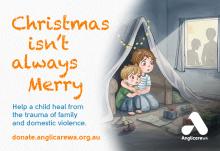

The 16 Days of Activism against Gender-Based Violence is an annual campaign that began on 25 November, the International Day for the Elimination of Violence against Women, and runs through International Human Rights Day on 10 December.
The campaign is supported by the United Nations through the Secretary General’s UNiTE by 2030 to End Violence against Women initiative.
The statistics that underpin this important campaign are sobering: one in three women experience gender-based violence during their lifetime, while more than five women or girls are killed every hour by someone in their own family. Perhaps most depressingly, less than 40% of women who experience violence seek help of any kind.
Despite the above, the backlash against women’s rights is underway around the world. The immense bravery of Iran’s women has captured the world’s attention as those who rule that nation continue to resist the movement for change.
According to the website, UN Women, anti-feminist movements are on the rise, attacks against women human rights defenders and activists are up, and the legal status of women’s rights is increasingly under threat in many countries.
Regressive new laws are exacerbating impunity for perpetrators of domestic violence, governments are using force against femicide and gender-based violence protestors, and women’s rights organizations are being increasingly marginalised.
In light of this, several WA-based Not For Profits are focusing on the rights of women, particularly those who are vulnerable and at risk, and making it a priority to improve their futures wherever possible.
Violence a way of life for many
Approximately 80 per cent of the women walking through the doors of St Bart’s Women’s Service are currently experiencing or have experienced, violence of some kind in their lives.
“Our Women’s Service has supported hundreds of women since its establishment in 2014, and this statistic paints a startling picture of just how many women in Western Australia are suffering - most often in silence - from violence, discrimination and harassment,” said St Bart’s Chief Executive Officer, Samantha Drury.
St Bart’s Women’s Service provides a safe and supportive environment for up to 28 women to work through the trauma and other circumstances contributing to their homelessness and help them regain their independence, maintain stable accommodation in the community and to reconnect to families and friends wherever possible.
More than 80 per cent of the women are aged over 46, with 40 per cent identifying as Aboriginal.
Sadly, many women don’t realise they are experiencing domestic violence and it is not uncommon for staff at St Bart’s to hear comments such as: “he didn’t hit me, he just called me some names so it’s not that bad,” or, “he is just old school – he provides for me so I must look after him.”
Upon entering St Bart’s Women’s Service, and with the support of a case manager and recovery support workers, women are guided through safety plans whether they are still with their male partner or they are wanting to safely leave the situation. These women are then linked in with other services while a visiting counsellor also provides in-house support. Referrals to Community Legal, along with a Family and Domestic Violence Legal Health Check may also be required to ensure the right legal assistance and support is allocated.
“If there is a Violence Restraining Order in place or a trial date set, the wonderful staff at our Women’s Service will attend court with the ladies if they would like that support,” Ms Drury said.
“By breaking down their relationships into patterns of behaviour, our case manager and recovery support workers are empowering these women to recognise negative behaviours in order to assist them to stay safe.”
Children caught in the crossfire
In every one in three family and domestic violence instances in WA, children have been exposed to the violence, according to Anglicare WA.
Research also shows that children who have experienced family and domestic violence are twice as likely to experience partner emotional abuse in adulthood as those who don’t,” said Philippa Boldy, Anglicare WA’s Director of Services.
Children are often the invisible victims of this crime. Rather than growing up in a safe and nurturing environment, they live in a home that is unpredictable and dominated by fear.
According to the Institute of Family Studies, this early exposure to abuse has short- and long-term impacts on children’s health and wellbeing, including increased rates of anxiety and depression, difficulties with learning, behavioural issues, a higher likelihood of future alcohol and drug misuse, and greater risk of homelessness.
Offering a safe haven
Based on the data and research, Anglicare WA developed the Young Hearts child counselling service to help break that cycle of family and domestic violence. Young Hearts is a completely free service, giving vulnerable children a safe space to explore their experiences of family and domestic violence.
“Through art, dance, play and talk therapy, Young Hearts empowers children to overcome their trauma, while developing the skills to build healthy relationships and thrive in the future,” said Ms Boldy.
“Young Hearts is a critical response service that directly supports children and young people who have experienced family and domestic violence. Through counselling, outreach and camps, the service helps foster feelings of safety and connection in affected children, improving their immediate health and wellbeing, as well as providing opportunities for healthy relationships in the future.
“With appropriate and timely support, children can recover from the trauma they have suffered.”
Young Hearts’ primary activities include providing individual counselling, group counselling and workshops to improve the safety and wellbeing of children and their families, as assessed though the intake process. Clients each engage with the service for 3–6 months, and during this time, their support will include talk, play and art therapy.
“Young Hearts also works to strengthen and restore attachment between young people and their primary caregivers.
“We offer professional development workshops for teachers and other school staff to ensure our young clients receive holistic trauma-informed support in their learning environment, as well as at home. This has the added benefit of improving overall understanding within the community of the impact of family violence on children and young people.”













